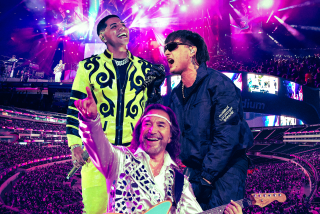Borderland Set on Pushing Creative Pop Music in Clubs
- Share via
SAN DIEGO — Robert Vaughn can empathize with the hundreds of local pop bands that can’t find work in San Diego nightclubs because they play originals instead of Top 40 covers.
His own group, Robert Vaughn and the Shadows, has an album out on Island Records and a single, “Justice,” on Billboard magazine’s Hot 100 chart, which gauges national record sales and airplay.
Even so, Vaughn said, local club bookings are “few and far between”--forcing him to work weekdays in a circuit-assembly plant to support his family and restrict rock ‘n’ rolling to the weekends.
“If you’re an original band in San Diego, you have to play underground, in garages or at private parties,” Vaughn said. “Club owners down here are only interested in Top 40 bands or recorded dance tunes.
“And that’s a shame, because in every other major city, original music clubs are the most happening places in town.”
To change that situation, both for his own band and for others that play only their own songs, Vaughn in October adopted as his motto the old labor cry, “Don’t mourn, organize.”
Through a series of weekly meetings, he’s been organizing his fellow musicians--along with songwriters, producers and “music lovers in general,” he said--to band together as the Borderland Music and Arts Assn., a nonprofit lobbying group “dedicated to promoting original music in San Diego.”
The strategy: urging the public to boycott discos and Top 40 clubs and patronize only those establishments that book original bands, Vaughn said.
And to accomplish this, he added, the association plans on mounting an extensive advertising campaign and hosting monthly “membership drive” parties at which deejays play nothing but records and tapes by home-grown talent.
“We need to let the clubs know that disco and Top 40 isn’t the only way to go,” Vaughn said. “People will come out to see original bands, but first, club owners have to give us a chance.
“And to convince them that original music is, indeed, a viable alternative, we have to make ourselves more visible. We have to work together to spread the fever of some of the stuff that’s coming out of this town.”
Initial nightclub reaction has been mixed.
“It’s a great idea,” said Jerry Herrera of the Spirit, one of the few nightclubs in town where original rock bands are welcome.
“The more clubs you get doing original music, the more people are aware of it, and that can only help the entire scene,” he said. “There are a lot of good bands that don’t want to do other people’s material, and they need more places to play.”
But at Paradise Bay, manager Susan Manis said the reason she books Top 40 bands is “that’s what our clientele is looking for.”
“People like to hear songs they know, songs they can dance to,” she said. “And if we would start booking only original bands, I don’t think that would change things.
“People would simply say, ‘That band’s not doing anything we know,’ and just stay home or go someplace else.”
Vaughn recognizes that merely pressuring club owners to book original bands, even by calling for a boycott of their establishments until they do, isn’t enough.
Borderland, he said, “needs to show them it can be done” by staging its own series of original music showcases--monthly at first, then weekly--in rented facilities.
“Each showcase will feature three or four of the best local bands, and we’re going to actively promote them to make sure we get a good turnout,” Vaughn said.
“And when club owners see how well we’re doing, they’re certain to follow suit. Club owners only see green. They’re out to make money, and they don’t care how they do it.
“Right now, Top 40 makes sense to them. But if people start supporting original music bands and original music clubs, that’s going to change.”
Borderland also intends to work with the bands themselves, Vaughn said, “to foster that spirit of competition, that let’s-be-better-than-the-band-next-door thing, that tends to create better bands, better songs and better musicianship.”
Efforts include an annual awards banquet and battle-of-the-bands, a monthly newsletter and possibly a radio or television show spotlighting local talent.
To pay for all this, Vaughn said, Borderland is soliciting corporate sponsorships and charging members annual dues ($20 for bands, $10 for individuals) as well as a one-time sign-up fee ($50 and $20).
Already, he said, the group has several dozen members, and after the first “membership drive” party in February, he expects the figure to exceed 100.
“With enough support, this thing can really turn this town around,” Vaughn said. “By spending time, energy and money, we can put San Diego on the map for having a vibrant original music scene, just like New York or Los Angeles.
More to Read
The biggest entertainment stories
Get our big stories about Hollywood, film, television, music, arts, culture and more right in your inbox as soon as they publish.
You may occasionally receive promotional content from the Los Angeles Times.










